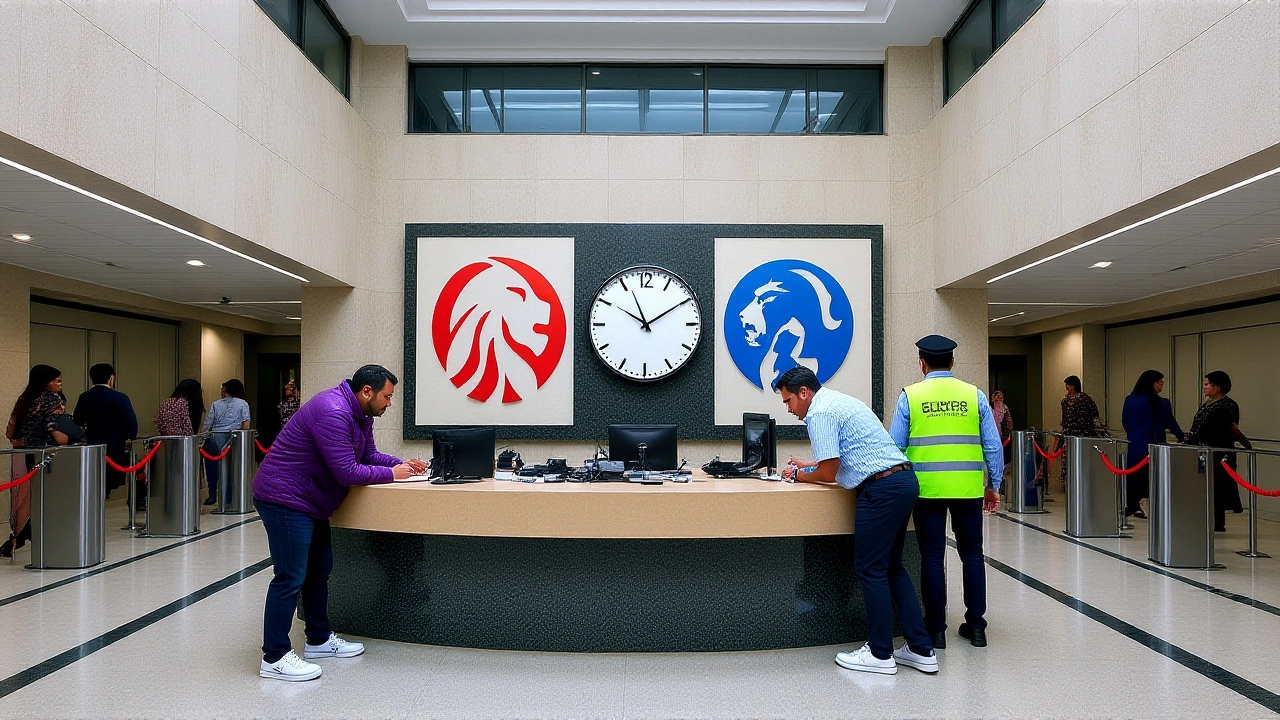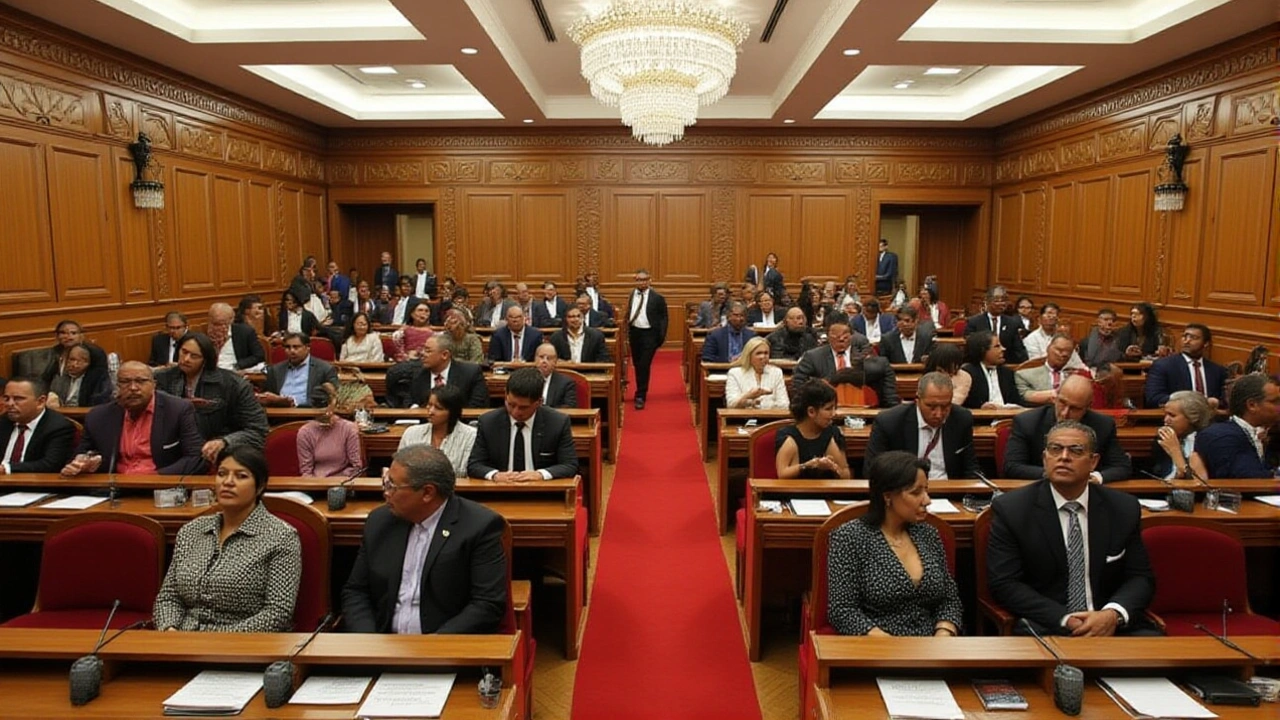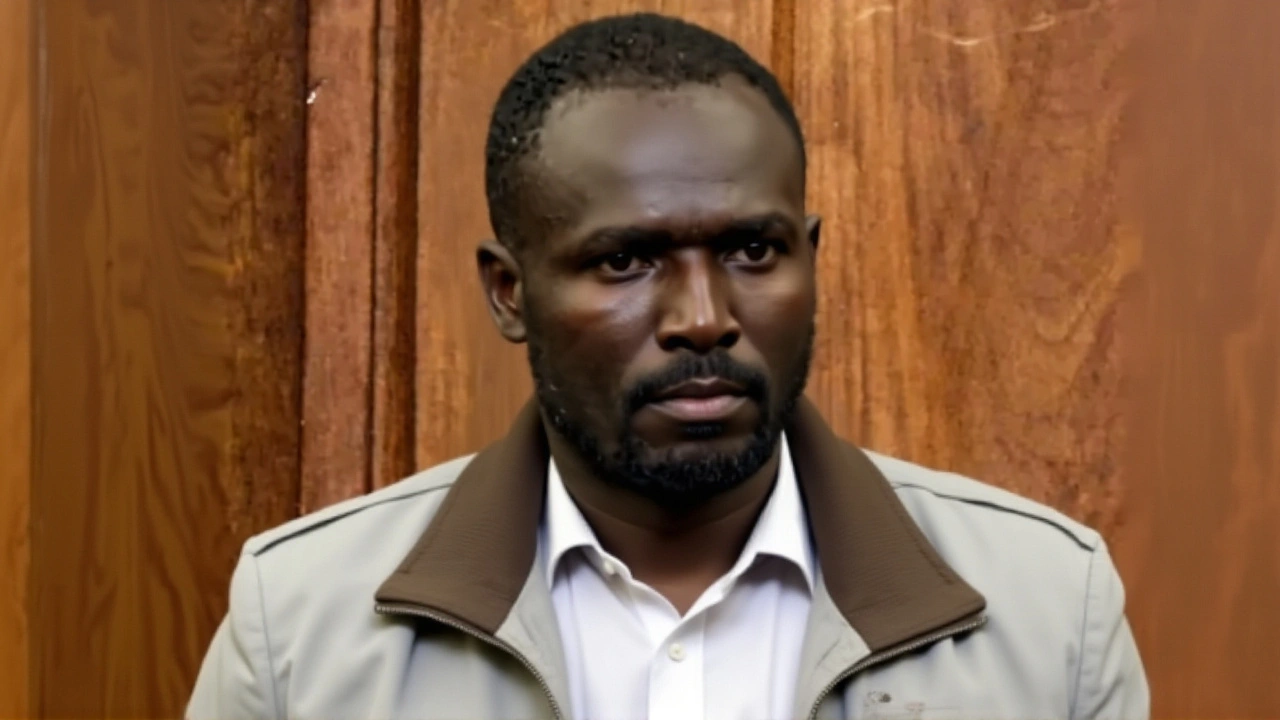15 Nov 2025
- 17 Comments
When Evans Agumba Oriato, a Customer Care Officer at the Kenya Revenue Authority’s Kisumu office, walked into court on November 13, 2025, he wasn’t just facing charges—he was standing at the center of a system many Kenyans know all too well: the quiet, persistent corruption that turns public service into a pay-to-play game. The accusation? He demanded half a million shillings to erase tax arrears for Jane Adeny Memorial School, a public secondary school in western Kenya. What makes this case stand out isn’t just the amount—it’s the chilling normalcy of it. A school administrator, desperate to avoid penalties, paid up. And then paid more. And then reported it.
The Transaction That Broke the System
It started on December 31, 2021, in a cramped office at the KRA’s Kisumu branch. Teresia Akinyi Wasonga, the school’s finance officer, was summoned to discuss irregularities in tax filings for the years 2016 to 2020. Instead of guidance, she was handed an invoice: Sh1 million to "reconcile" the audit report. She paid Sh500,000 upfront, hoping it would be the end of it. But Oriato wasn’t done. On January 13, 2022, he called her back—this time asking for another Sh250,000. She paid. Again. And again, he demanded more. That’s when she did the unthinkable: she went to the Ethics and Anti-Corruption Commission (EACC).The EACC, operating under Article 79 of Kenya’s Constitution, doesn’t just investigate corruption—it tracks patterns. And this wasn’t an isolated incident. Between 2021 and 2025, the EACC’s Western Regional Office recorded at least 17 similar complaints involving KRA staff in Kisumu County alone, mostly targeting schools, churches, and small NGOs struggling with complex tax codes. Most victims, like Wasonga, paid out of fear. But she didn’t. And that made all the difference.
Three Counts, One Pattern
The Office of the Director of Public Prosecutions (ODPP) didn’t just file one charge. They filed three. Each one precise, each one damning:- Count One: Soliciting Sh500,000 on December 31, 2021, in exchange for altering the audit report
- Count Two: Agreeing to receive Sh250,000 on January 13, 2022
- Count Three: Actually receiving that Sh250,000 on the same day
Under Section 6(1) of the Anti-Bribery Act No. 47 of 2016, these aren’t minor offenses—they’re criminal acts punishable by up to 14 years in prison. Oriato, who had worked at KRA for over seven years, was arrested on November 12, 2025, after being summoned by EACC investigators. He spent the night in custody at the Railways Police Station in Kisumu before being arraigned the next morning before Chief Magistrate Benson Ireri.
He denied all charges. Loudly. But the prosecution didn’t need his confession. They had bank records, text messages, and a recorded conversation where Oriato said, "I can make this go away, but you need to move fast. The audit team is coming next week."

Why This Matters Beyond One School
Think about what this means for public education in Kenya. Schools like Jane Adeny Memorial don’t have legal teams. They don’t have accountants on retainer. They rely on government officers like Oriato to guide them through compliance. When those officers become gatekeepers of corruption, it doesn’t just hurt one institution—it undermines the entire system. Tax arrears are meant to be resolved through fair audits, not backroom deals. When a school pays a bribe to clear its books, it’s not just violating tax law—it’s teaching students that integrity is optional.The EACC says this case is part of a broader crackdown. In 2024 alone, the commission prosecuted 89 public officials for bribery related to tax services—up 42% from 2022. Most were from KRA and the National Treasury. But few made headlines. This one did, because the victim had the courage to speak up. And because the money was traced.
"This isn’t about one corrupt officer," said EACC spokesperson Mercy Njoroge in a statement. "It’s about the culture that lets him think he can get away with it. We’re targeting the service delivery points—the frontlines where ordinary people meet the state. That’s where corruption lives.""
What Happens Next?
The case was scheduled for pre-trial directions on November 25, 2025—though some reports cited November 24. Either way, the timeline is tight. All witnesses, including Wasonga and three KRA internal auditors who flagged the discrepancies, are ready to testify. Oriato was released on a Sh500,000 bond with a surety of equal value—a common but controversial practice that lets accused officials walk free while the state bears the burden of proof.Legal experts warn: if the prosecution fails to secure a conviction here, it could embolden others. "The public needs to see consequences," said Dr. Amina Mwangi, a law professor at the University of Nairobi. "When someone in uniform can demand cash to fix tax records, it tells every school, every clinic, every small business that the rules don’t apply to everyone. That’s the real cost of corruption—not the money stolen, but the trust destroyed."
Meanwhile, KRA has suspended Oriato pending trial. The agency says it’s reviewing its customer service protocols in Kisumu, including mandatory audio recording of all taxpayer interactions. Whether that’s enough remains to be seen.

Background: The Long Shadow of Tax Corruption in Kenya
Kenya’s tax system has long been a battleground between compliance and coercion. Since the 2016 Anti-Bribery Act, prosecutions have increased—but so have complaints. In 2023, a World Bank study found that 31% of small businesses in western Kenya reported paying bribes to KRA officers to avoid penalties. The figure was 47% for schools and NGOs.What’s striking is how often these bribes are framed as "service fees." Officers don’t always demand cash outright. They say, "I can help you," or "This is how we do things here." Victims often don’t realize they’re being extorted until it’s too late. That’s why the EACC’s focus on recording interactions and whistleblower protection is so critical.
Even more troubling: Jane Adeny Memorial School’s tax arrears—estimated at Sh1.2 million—were largely due to misclassification of income, not fraud. With proper guidance, the debt could have been restructured. Instead, the school was held hostage by a single officer’s greed.
Frequently Asked Questions
How does this affect public schools in Kenya?
Schools like Jane Adeny Memorial rely on public funding and limited administrative support. When KRA officers demand bribes to fix tax filings, schools are forced to divert funds meant for textbooks, meals, or teacher salaries. In 2024, the Ministry of Education estimated that over 1,200 public secondary schools in western Kenya faced similar pressure, with 28% reporting they paid bribes to avoid penalties. This isn’t just corruption—it’s an education crisis in slow motion.
Why wasn’t this reported sooner?
Many victims fear retaliation—suspension of services, audits, or even false charges. In 2022, a similar case in Nakuru was dropped after the complainant withdrew her statement, citing intimidation. Wasonga’s case succeeded because she documented every interaction, kept receipts, and contacted the EACC’s Western Regional Office directly. Her courage is rare—and necessary.
What’s being done to prevent this from happening again?
KRA has pledged to install audio-visual recording devices in all customer service counters by March 2026 and launch a public portal for anonymous tax compliance complaints. The EACC is also training 500 school administrators on their rights under the Public Procurement and Asset Disposal Act. But without consistent enforcement and whistleblower protection, these measures risk becoming symbolic.
What are the penalties if Oriato is convicted?
Under Section 18 of Kenya’s Anti-Bribery Act, a conviction on each count carries a fine of up to five times the bribe amount or 14 years in prison—or both. If convicted on all three counts, Oriato could face up to 42 years. He’d also be barred from public service for life. The court will determine whether the bribes were part of a continuing scheme, which could trigger enhanced penalties.
How common are bribery cases against KRA officers?
KRA is Kenya’s most targeted agency for bribery complaints. Between 2020 and 2024, the EACC recorded 312 formal complaints against KRA staff, with 89 resulting in prosecution. The majority involved customer care officers in county offices—like Kisumu—who have direct access to taxpayers. Most cases involve tax filing, audit adjustments, or clearance certificates. This case is unusual because it involves a school and multiple payments over time.
What can citizens do if they’re asked for a bribe?
Don’t pay. Document everything: names, dates, amounts, and methods of communication. Report immediately to the EACC’s toll-free line (0800 720 000) or via their mobile app. The EACC offers anonymity and witness protection. In 2023, 42% of successful prosecutions came from tips filed through these channels. Silence helps the corrupt. Speaking up helps everyone.


deepika singh
November 17, 2025Wow. This is the kind of story that gives me hope. One woman standing up to a whole broken system? That’s courage with capital C. Schools shouldn’t have to pay bribes to keep their books clean - they need books, not backdoor deals. Kudos to Teresia for not backing down. This is how change starts - one brave person at a time. 🌟
amar nath
November 17, 2025bro this is wild but also so common in india too 😭 like imagine a school principal getting extorted by tax guys... we got the same vibes with gst officers in delhi. they say 'i can fix it' then you pay and they still audit you next month. its a game. but at least here they got audio proof. in india? we just pray and pay.
Pragya Jain
November 19, 2025Kenya needs to stop acting like it's the only country with corruption. Look at India - we’ve had systemic graft since independence. At least this guy got caught. In India, they get promoted. This is just performative justice. The real problem? Weak institutions. And Kenya’s are no better.
Shruthi S
November 21, 2025my heart just broke for that school 😭 imagine being a teacher there and knowing the money for chalkboards went to some officer’s pocket. this is so heartbreaking. thank god for people like Teresia. she’s a real hero. 💙
Neha Jayaraj Jayaraj
November 23, 2025OMG I JUST WATCHED A DRAMA ON NETFLIX THAT WAS EXACTLY THIS 😱 like the officer was named ‘Bhaiya’ and he wore a gold chain and said ‘I can make your problems disappear’ and then he had a secret safe in his office with 100k in cash??!! THIS IS LITERALLY A TV PLOT BUT IT’S REAL??!! WHO WROTE THIS SCRIPT??!! 🤯
Disha Thakkar
November 23, 2025Let’s be real - this is just performative outrage. The EACC prosecutes one officer so they can pat themselves on the back while the entire system remains intact. The real corruption isn’t Oriato - it’s the fact that this case even made headlines. Most victims are too scared, too poor, too invisible. This isn’t justice. It’s PR.
Abhilash Tiwari
November 23, 2025man i just sat here quiet for 10 mins thinking about how heavy this is. a school admin having to choose between feeding kids and paying a bribe? that’s not a tax issue. that’s a moral collapse. i hope they lock him up. not for the money - for the shame.
Anmol Madan
November 24, 2025hey so i just called the EACC helpline and asked if they take tips from outside kenya? like if someone in india sees this and wants to report a similar case? they said yes??!! mind blown. i’m gonna forward this to my cousin who works in a school in kerala. maybe she can use this as a template. 🙌
Shweta Agrawal
November 25, 2025i think we should all just send our tax records to the EACC and say we’re ready to help. if more people did this maybe they’d have the manpower to actually fix things instead of just catching one guy. this is good but it’s not enough. we need a movement not a moment
raman yadav
November 26, 2025you think this is corruption? this is just capitalism with a side of bureaucracy. every system is rigged. the real question is why are we surprised? the state is a machine that eats integrity and spits out receipts. this officer? he’s just the grease in the gears. the system designed this. we just got lucky he got caught. next week it’ll be someone else. and you’ll still pay.
Ajay Kumar
November 26, 2025fake news alert. this whole thing is staged. the EACC and KRA are in cahoots. they need a scapegoat to make the public think they’re doing something. the real bribe-takers? they’re in Nairobi with diplomatic immunity. this guy? he’s the fall guy. the audio? planted. the receipts? forged. the school? owned by a political ally. this is a distraction. don’t fall for it.
Chandra Bhushan Maurya
November 27, 2025i cried. not because it’s shocking - because it’s so ordinary. this happens every day. a mother selling her necklace to pay a tax bill. a nurse skipping lunch so her clinic doesn’t get shut down. this isn’t about one officer. it’s about a country that tells its people: ‘you’re not worth protecting.’ and yet - Teresia didn’t break. that’s the real miracle.
Hemanth Kumar
November 29, 2025It is imperative to underscore that the procedural integrity of the prosecution hinges upon the admissibility of recorded communications under Section 81 of the Evidence Act. Furthermore, the temporal alignment of the payments with the audit cycle suggests a patterned exploitation of institutional vulnerability, which may constitute a continuing offense under the Anti-Bribery Act. Legal scholars should analyze the precedent-setting nature of this prosecution vis-à-vis public educational institutions.
kunal duggal
November 29, 2025From a governance perspective, this case exemplifies the failure of the principal-agent model in public service delivery. The KRA officer, as the agent, exploited asymmetric information and bounded rationality of the school’s finance officer, creating a rent-seeking equilibrium. The introduction of mandatory audio recording is a mechanism to reduce information asymmetry - but without behavioral incentives for compliance, it remains a technological band-aid. We need institutional redesign, not surveillance.
Ankush Gawale
November 30, 2025maybe we should all just stop paying taxes until the system changes? i know it sounds extreme but if everyone refused to pay until they were treated fairly… wouldn’t that force real reform? i’m not saying it’s easy but… maybe it’s the only thing that works?
रमेश कुमार सिंह
December 1, 2025in the end, it’s not about the money or the jail time. it’s about the child in that school who sees their teacher cry because the books didn’t arrive. that child learns: the world rewards silence. but Teresia? she taught them something else. she taught them to speak. and that? that’s the real tax reform.
Krishna A
December 1, 2025why is everyone acting like this is rare? my cousin works at a hospital in pune and they pay 10k every month to the tax guy just to keep the lights on. this is how the world works. you don’t fight it. you adapt. or you disappear.